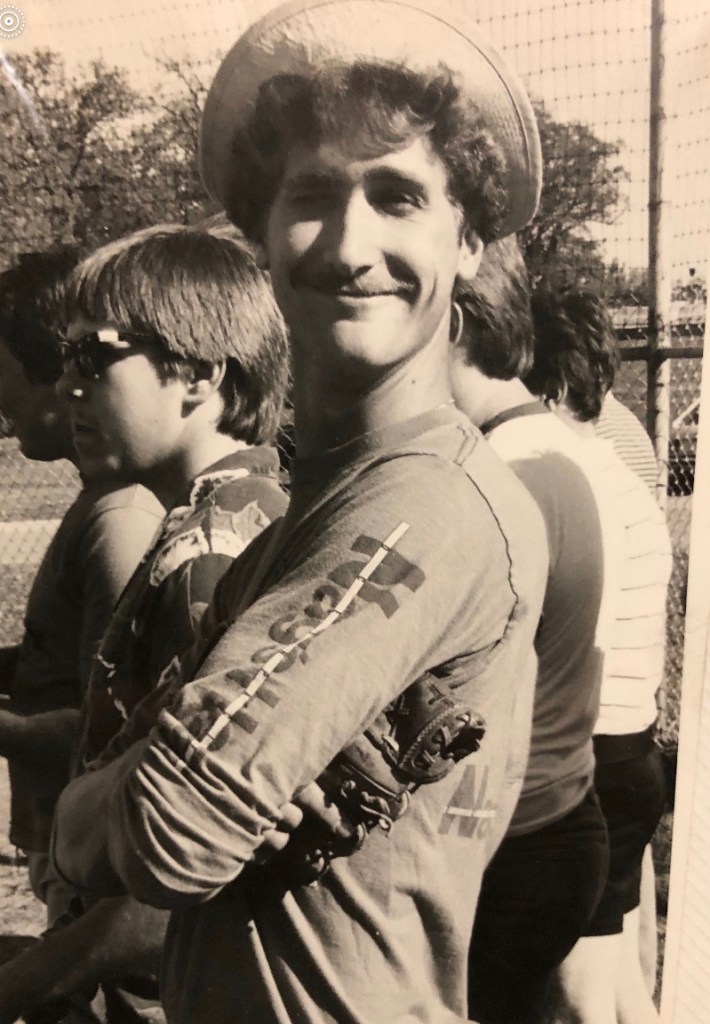Arthur and Christine grew up in my hometown. Arthur and Christine were one of those high school couples who, when they got together, everyone that I know thought, oh wow, they are perfect for each other. As she will tell you in the following paragraphs, after falling in love, they married then built a life together. Careers, children, dreams achieved. And then illness entered their lives and changed everything. Not long ago, I asked Christine if she might ever want to write something for my blog and yesterday she sent me this. It is a beautiful, affecting reflection on grief, something that touches all of us.
When Grief Lives Alone

My war with grief began with the loss of my husband, Arthur. I never imagined that the crush I developed in geometry class for the tall, skinny boy with a cockiness that made me smile would evolve into a love that defined me. We started our journey together with a first date when we were barely 16 years old. We knew, after that first evening together, that we shared a special connection. Love came to us very quickly and we formed a bond that sustained us through the challenges of high school and college and as we matured into adults. We married six and a half years after that first date, and over the subsequent 30 years we built a good life together as we advanced our professional careers and raised three beautiful baby girls into smart, talented, independent women. Arthur was my anchor, and around him I built my life, my definition of self and my hopes for the future. Our world was shattered when my strong, active, non-smoking husband was diagnosed with stage four lung cancer. From that moment on, our lives were reduced to the sole purpose of keeping Arthur alive. There were endless physicians, surgeons, medical tests and surgeries, along with chemotherapy, immunotherapy, targeted therapy and radiation. But in the end, Arthur’s cancer was stronger than the weapons we had to fight it, and he died a short 15 months after that first diagnosis.
I have lost other loved ones to death, including my parents and beloved grandparents, but nothing prepared me for the overwhelming pain of losing my Arthur. Every day became a battle with this crushing grief that caused constant tears, a closing of my throat, a pit in my stomach and a very real, physical pain in the center of my chest. I didn’t understand the term “heartbreak” until I felt that pain as I stood by Arthur’s side as he took his final breath. It has been over a year now since that night, and in all that time I haven’t been able to articulate the experience of living with and battling this grief, even to myself. But as I lay in bed this morning, letting my mind wander as one does in those first moments after waking, the following analogy formed itself in my conscious thought. I thought perhaps the documentation of these thoughts might help those who haven’t experienced a loss of this magnitude yet to understand the war others wage with grief following a profound loss. Selfishly, I hope it might also help me as my own personal war rages on.
I don’t think of grief as an emotion such as happiness or sadness or fear. To me, grief following a profound loss is more like an entity; an enemy. The loss that results in grief of this kind steals away more than a cherished loved one or a soulmate. It steals your life; it steals your identity. You eventually realize your can’t move on along life’s path. Your path no longer exists. Your life as you knew it no longer exists, and you can’t return to the person you once were. You can’t have the same goals and dreams because your life and your identity were irrevocably tied to a person who is now lost to you. There is an abundance of pain, anger, guilt and regret that constantly brings you to your knees. But eventually you must accept that to survive, you have to win the war with grief, reinvent yourself and construct a new life along the way. As is always the case, war is comprised of many battles. Some battles you will win, and some you will lose. The goal is to be standing when the war is over and the smoke clears. Even if the person standing there is someone you don’t recognize.
At the beginning of the war, after your loss, all you feel is pain. The sadness is overwhelming and it dominates every thought and every emotion. Grief surrounds you and you can’t separate yourself from it. You constantly live with the grief and it manifests itself with tears, a tightness in your throat, a sickness in your stomach and the pain in your chest that never goes away. You don’t possess the ability to control your emotions or the tears and sadness that make those around you uncomfortable. You tell yourself you won’t cry, but then the briefest thought or mention of your loved one instantly brings on a pain that smothers you and robs you of your control. You find yourself avoiding people as much as possible, and when you must be with others you try to dominate conversation with “other” topics so you won’t embarrass yourself again by crying. This is the time when you are at your weakest and grief has the upper hand. Grief is your constant companion, and it always wins the early battles.

After a time, and the amount of time differs from one person to the next, you develop the strength to separate yourself from the grief for brief periods of time. It’s like you built a room around it. You created a place for the grief to live that is adjacent to you, but it no longer constantly surrounds and smothers you. Unfortunately, the room where the grief now lives has no door. You can’t fully separate yourself from it. The grief can still move in and out of the room at will, so while you can go hours and eventually even days without the pain, thoughts of your loved one still calls the grief to you and the pain is as intense as it was in the beginning. You come to realize that the grief has control over your love and your memories. Grief lives in the room you painstakingly constructed, but it doesn’t live there alone. It lives with all of your memories as its companion. You don’t possess the ability to talk about, or even think about, your loved one without calling the pain to you as well. In this battle, grief still wins. You are stronger; you fought valiantly; you gained some ground with the construction of the room; but as long as the room has no door and as long as grief lives with your memories, grief still wins.
As the war rages on, you eventually develop the strength and strategies to build a door for the room. You can intentionally close that door, and close the grief away for longer and longer periods of time. You can go days, even weeks without experiencing that pain. You can create tasks for yourself to keep your mind and body busy and distracted. You can leave your house and have conversations with others without crying. You start to feel like a human being again, and you slowly start to construct that new life and new identity. The people around you comment that you are “better” as they witness you taking those difficult steps forward. But the grief still lives in that room, and it is still strong. The door to grief’s room tends to open more often at night when you are alone, or in the early mornings when you wake from your dreams. You still cry and feel the intense pain, but more often now when you are alone and others can’t see. Grief still holds your memories captive in that room. You ache to remember the good times; to look at old photographs and talk about your loved one and feel the love and the happiness you shared rather than the pain and anger of that inexplicable loss. But you can’t, because your memories still live in that room bound to your grief. Even though you have made substantial progress, and the people around you see you as a whole person again, you know you are still broken because you can’t separate the grief from your memories. You haven’t won the war and grief perseveres.
Unfortunately, this is where my personal experience with grief ends for now. It has been one year and 24 days since my husband died, and I continue to fight daily to keep the door to grief’s room closed, even though I long to freely remember my Arthur and the love we shared. I want to cherish those memories, and to share them with our grandchildren so they will come to know the grandfather they are too young to remember. Arthur’s biggest heartbreak was knowing that our grandchildren would not have any actual memories of him. I carry the responsibility of ensuring that those sweet babies know him as their “Poppie” and that they understand the love, hopes and dreams he had for each of them. I owe this to my Arthur, but for now my grief still holds the high ground. Through this process I have come to understand the next step, and to have hope that I will one day be able to take it. I understand that I need to fight the grief for those memories, and I need to relocate my memories to a room of their own in my mind. I also understand the grief will always live in its room, hopefully locked away and alone most of the time. When grief lives alone in its room, I will have finally won the war and will have my memories without the pain. I will be able to look at our pictures currently packed away in boxes and smile instead of cry. I will be able to talk about my Arthur with love, pride and humor rather than heartache. When grief lives alone, I will finally have my Arthur again.
